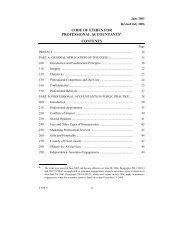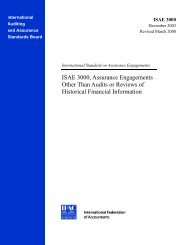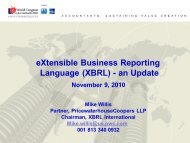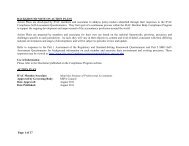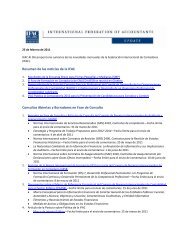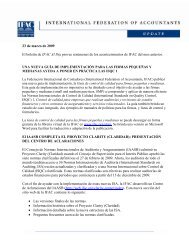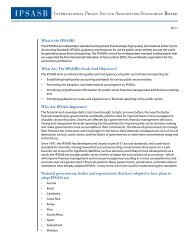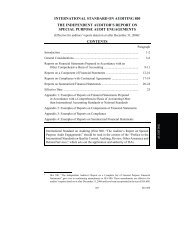ipsas 29—financial instruments: recognition and measurement - IFAC
ipsas 29—financial instruments: recognition and measurement - IFAC
ipsas 29—financial instruments: recognition and measurement - IFAC
Create successful ePaper yourself
Turn your PDF publications into a flip-book with our unique Google optimized e-Paper software.
FINANCIAL INSTRUMENTS: RECOGNITION AND MEASUREMENT<br />
B.3 Definition of a Derivative: Prepaid Interest Rate Swap (Fixed Rate Payment<br />
Obligation Prepaid at Inception or Subsequently)<br />
If a party prepays its obligation under a pay-fixed, receive-variable interest rate<br />
swap at inception, is the swap a derivative financial instrument?<br />
Yes.<br />
To illustrate: Entity S enters into a CU100 million notional amount five-year payfixed,<br />
receive-variable interest rate swap with Counterparty C. The interest rate of<br />
the variable part of the swap is reset on a quarterly basis to three-month LIBOR. The<br />
interest rate of the fixed part of the swap is 10 percent per year. Entity S prepays its<br />
fixed obligation under the swap of CU50 million (CU100 million × 10 percent × 5<br />
years) at inception, discounted using market interest rates, while retaining the right to<br />
receive interest payments on the CU100 million reset quarterly based on three-month<br />
LIBOR over the life of the swap.<br />
The initial net investment in the interest rate swap is significantly less than the notional<br />
amount on which the variable payments under the variable leg will be calculated. The<br />
contract requires an initial net investment that is smaller than would be required for<br />
other types of contracts that would be expected to have a similar response to changes in<br />
market factors, such as a variable rate bond. Therefore, the contract fulfils the “no<br />
initial net investment or an initial net investment that is smaller than would be required<br />
for other types of contracts that would be expected to have a similar response to<br />
changes in market factors” provision of IPSAS 29. Even though Entity S has no future<br />
performance obligation, the ultimate settlement of the contract is at a future date <strong>and</strong><br />
the value of the contract changes in response to changes in the LIBOR index.<br />
Accordingly, the contract is regarded as a derivative contract.<br />
Would the answer change if the fixed rate payment obligation is prepaid<br />
subsequent to initial <strong>recognition</strong>?<br />
If the fixed leg is prepaid during the term, that would be regarded as a termination of<br />
the old swap <strong>and</strong> an origination of a new instrument that is evaluated under<br />
IPSAS 29.<br />
B.4 Definition of a Derivative: Prepaid Pay-Variable, Receive-Fixed Interest Rate<br />
Swap<br />
If a party prepays its obligation under a pay-variable, receive-fixed interest rate<br />
swap at inception of the contract or subsequently, is the swap a derivative<br />
financial instrument?<br />
No. A prepaid pay-variable, receive-fixed interest rate swap is not a derivative if it is<br />
prepaid at inception <strong>and</strong> it is no longer a derivative if it is prepaid after inception because<br />
it provides a return on the prepaid (invested) amount comparable to the return on a debt<br />
instrument with fixed cash flows. The prepaid amount fails the “no initial net investment<br />
or an initial net investment that is smaller than would be required for other types of<br />
1161<br />
IPSAS 29 IMPLEMENTATION GUIDANCE<br />
PUBLIC SECTOR


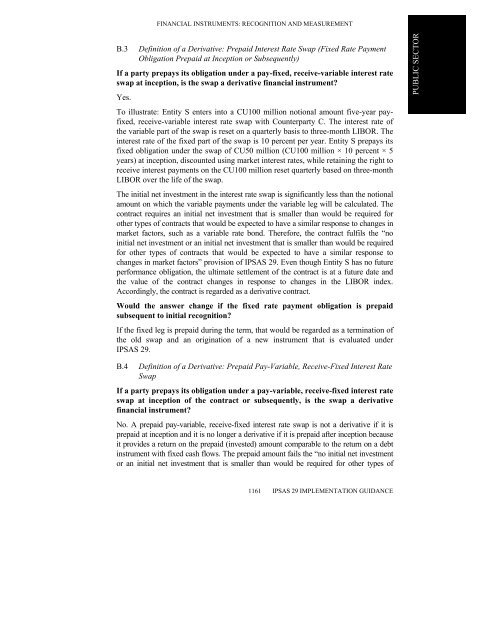
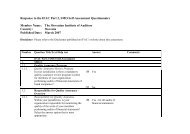
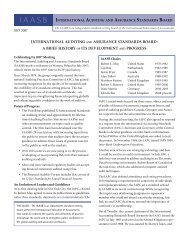
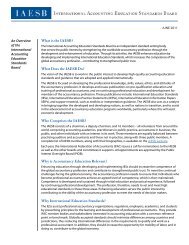
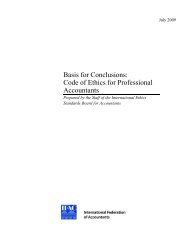
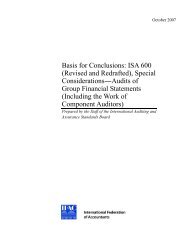
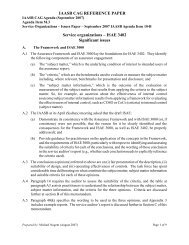
![International Auditing and Assurance Standards Board [IAASB] - IFAC](https://img.yumpu.com/22522144/1/190x245/international-auditing-and-assurance-standards-board-iaasb-ifac.jpg?quality=85)
